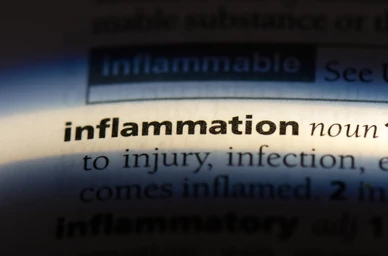Health & Wellness
A Defensive Response: Inflammation – The Good and the Bad
 The word inflammation might conjure up a swollen ankle from accidentally rolling it from stepping off a curb. In the last couple of decades, inflammation has emerged as a key factor in several diseases, such as Alzheimer’s, cardiovascular disease, arthritis, diabetes, obesity, Parkinson’s and some infectious diseases like HIV/AIDS and COVID-19.
The word inflammation might conjure up a swollen ankle from accidentally rolling it from stepping off a curb. In the last couple of decades, inflammation has emerged as a key factor in several diseases, such as Alzheimer’s, cardiovascular disease, arthritis, diabetes, obesity, Parkinson’s and some infectious diseases like HIV/AIDS and COVID-19.
Inflammation has been on my mind because my husband recently had wrist surgery after a freak skiing accident due to equipment failure. During surgery and post-surgery, the body goes through an inflammatory response. This is normal. It’s the body’s defensive response governed by the immune system. It’s how the body defends itself against tissue damage and foreign invaders. It’s immediate, acute and very effective.
But sometimes, the inflammation response isn’t enough to clear an infection or virus, or it might take a long time for an injury to heal. In this case there is a persistent viral or infection load that causes chronic inflammation. Chronic simply meaning long-term. When healing from an injury the body is good about concentrating efforts to that area in a tempered and controlled manner.
But if there is disease from high blood pressure, obesity, diabetes, cardiovascular disease, not only can this complicate the inflammatory response, these lifestyle diseases contribute to chronic inflammation at the cellular level. This, this can have long-term impacts on health, quality of life and recovery.
Your skin is a good representation of overall health. Rashes can be an allergic reaction or a sign of chronic inflammation. Eczema and psoriasis can be exacerbated by chronic inflammation along with other skin conditions like rosacea and blemishes.
Diet can have a significant impact on chronic inflammation and certain foods are definite triggers for existing chronic inflammation. The big culprits are:
- Sugar
- Saturated fats and Trans fats
- Refined carbohydrates
- Alcohol
- Red meats and processed meats
- Sodas and other sweetened drinks
- Fried foods
Granted, any singular food can have zero negative impact on the body. Regular intake of these types of foods can make it harder on your body, especially if it’s already dealing with inflammation. No amount of herbal anti-inflammatory supplementation is going to counter act a bad diet. What you eat has a far greater impact on health than supplementation of any kind.
Fighting Chronic Inflammation
One of the most powerful tools to combat inflammation comes from the grocery store and not from the pharmacy or supplement isle. An anti-inflammatory diet should include these foods:
- Tomatoes
- Olive oil
- Green leafy vegetables (such as spinach, kale, collards)
- Nuts (raw or blanched) – especially walnuts and almonds
- Fatty fish (like salmon, mackerel, tuna, and sardines)
- Fruits such as strawberries, blueberries, cherries, apples, and oranges
Certain vegetables and fruits are high in natural antioxidants and polyphenols—protective compounds in plants. Coffee, also high in polyphenols, may protect against inflammation as well.
Aim for an overall healthy diet. The Mediterranean diet—high in vegetables, fruits, nuts, fish, and healthy oils—can reduce levels of inflammation. Even significantly reducing intake of processed foods can have a noticeable effect on your physical and emotional health as well as chronic inflammation.
Along with an anti-inflammatory diet, consider adding exercise to your daily regimen. Exercise is generally good for just about every component of your health, including inflammation. The adage ‘Exercise is medicine’ has more truth to it than people realize. Aside from releasing ‘feel good’ hormones, exercise also releases proteins that fight inflammation. Doing 30 minutes most days of the week can impact health in a myriad of ways. The secret to consistency is finding something you enjoy and doing it with someone else.
Chronic stress can be a major contributor to chronic inflammation. It’s not called the silent killer for no reason. Chronic stress causes the release of hormones that can put pressure on your immune system. Exercise—here we are again—can go a long way towards relieving stress, but so can breathing exercises, yoga, or even just spending time with friends and family to let some of that stress go.
Life often throws us challenges and it’s not easy to navigate. You are the one in control of your well-being and your health. This is empowering but also challenging as people often resist change. Even when they know it will be better for them. I wrote an article about implementing change that you can check out here on my blog.
Remember, we were all born to transform. Let’s do it with kindness and grace.
Keep looking up!
Forever Your Champion,
Samantha
